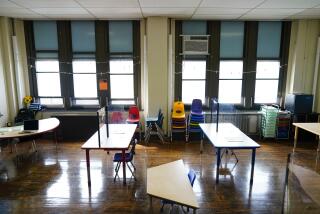Working More, Learning Less
- Share via
WASHINGTON — American high school seniors work more hours at part-time jobs, endure more threats and theft at school and study less than their foreign counterparts.
These snapshots were among the lesser-noted facets of the much-discussed international survey released last month that showed America’s 12th-graders ranking in the lower third among 21 nations in tests measuring knowledge of math and science.
“Studying and jobs, the two are inversely related,” said William H. Schmidt, a Michigan State University professor who coordinated American research on the tests. “The more time you’re on the job, the less time you study. That will have an impact on how much you learn.”
Most data about students’ everyday life that researchers gathered as part of the Third International Math and Science Study portrayed American and foreign high school seniors as very similar.
Seniors in America watched the same amount of television as international students, for example--an average of 1.7 hours per day.
But increasingly, education experts are focusing on lifestyle to explain the scores of U.S. students, which caused President Clinton to renew his call for sweeping reforms of the public school system.
Although educators concluded that the content of high school math and science courses, including advanced classes, deserved the most blame for Americans’ performance, some of the extracurricular findings also created cause for concern, Schmidt noted. “Unfortunately, they raise more questions than they provide answers,” he said.
One question to ponder: Why is it that 55% of American seniors spent more than three hours per day at an after-school job, while less than half that figure--27%--among foreign students reported that they worked even one hour a day?
“In Europe and most of the rest of the world, you’re like a little prince or princess if you go to school,” said Gary Weaver, an expert on student issues at American University in Washington.
Conversely, working “is part of American life,” Weaver said. “Here in the U.S., if you’re not working, you really don’t have any status.”
Alexander Astin, who directs the Higher Education Research Institute at UCLA, said Americans place more emphasis on consumerism than foreigners, and teenagers here flock to after-school jobs in a “logical extension of materialism.”
“The closer they get to full time has a direct, negative effect on almost all educational outcomes, on their grades, on whether they get into college,” Astin said.
But some educators pointed out that working part-time is often a necessity for teenagers, and tends to build character and pay dividends later in life.
In some cases, “families may have had the need for [their children] to do some earning,” said John Hyman, a professor who studies American culture at American University. “While it is tempting to make something cultural of it, I’m a little leery.”
Hyman also noted that the students who participated in the international tests, administered during the 1994-95 school year, reached legal, part-time working age during the economic recession. “An important part of success for beginning students in college is the ability to balance time well. The folks who had a job in high school might have a leg up,” he said.
In addition to the findings on work habits, the survey reported that nearly a quarter of American high school seniors--24%--said they had been a victim of theft in the month before the examination. Only 13% of foreign students reported having had an item stolen. Eleven percent of American seniors said they felt threatened by another student in the prior month, compared to 7% of foreign students.
“There’s a difference between America and the other countries just because there’s a difference in crime in general,” said Denise Gottfredson, a professor of criminology at the University of Maryland. “The U.S. is consistently higher on most measures of crime.
“It’s definitely the case that kids who go to school in schools with higher crime rates don’t do as well academically. It’s almost impossible to say which comes first.”
More to Read
Sign up for Essential California
The most important California stories and recommendations in your inbox every morning.
You may occasionally receive promotional content from the Los Angeles Times.













